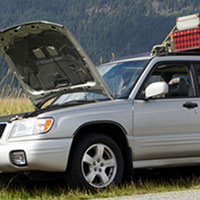Car warranty vs. car insurance
Compare coverage, requirements and providers

Car warranties and car insurance have some similarities — both can provide financial protection in case you need car repairs. However, they’re very different in terms of coverage, requirements and providers.
Key insights
- Car insurance protects you after an accident, covering damage and injuries, while an auto warranty helps cover mechanical failures, such as a transmission problem.
- Extended car warranty coverage depends on the terms and can include drivetrain, powertrain, bumper-to-bumper, corrosion and wrap policy coverage. The average cost of an extended warranty is around $2,500.
- Car insurance is legally required in nearly all states. Coverage includes liability, collision, comprehensive, uninsured motorist, medical payments and gap coverage. The average cost of full coverage is $1,190 per year.
- While car insurance is legally required, a car warranty isn't. Having both can save money, especially for older cars no longer covered by a manufacturer’s warranty.
Difference between warranty and insurance
Car insurance protects you after an accident, whereas an auto warranty helps cover mechanical failures.
For example, a warranty provides coverage if your car breaks down because of a transmission problem and needs repairs. But if you're in a car accident that’s your fault and your car is damaged, you could use insurance to help pay for repairs.
There is also a difference between an extended auto warranty, also called a vehicle service contract, and the warranty that comes from the manufacturer.
“Perhaps the biggest difference between the warranty and a vehicle service contract is the fact that the latter must be bought, where the original warranty comes with the price of a new car,” according to Matas Buzelis, an automotive writer and head of communications at the vehicle history report platform carVertical.
| Car warranty | Car insurance | |
| Legally required* | ||
| Coverage | Regular wear and tear, defective parts | Damage and injuries (liability) |
| Covers breakdowns | ||
| Covers damage caused by accidents | ||
| Vehicle age and mileage restrictions | ||
| Average costs | $1,000 to $4,000 (total) | $800 to $3,000 (per year) |
| Payment plans available | ||
| Term length | Varies | Typically 6 months to 1 year |
| Providers | Car manufacturers, dealerships and third-party vendors | Insurance companies and agents |
| Car warranty | Regular wear and tear, defective parts | $1,000 to $4,000 (total) | Varies | Car manufacturers, dealerships and third-party vendors | |||||
| Car insurance | Damage and injuries (liability) | $8000 to $3,000 (per year) | Typically 6 months to 1 year | Insurance companies and agents |
*Auto insurance is mandatory in most states.
What to know about car warranty coverage
Extended car warranties cost $1,000 to $4,000.
An extended car warranty is a vehicle service contract. It’s “extended” because it provides protection after a manufacturer's warranty that is included on a new car or a used car expires.
What’s covered depends on the terms of the warranty you purchase. Stated component coverage specifically lists everything that’s covered and varies by company.
On the opposite end, “exclusionary” warranties cover everything except for specific items listed in the contract. This is considered one of the most comprehensive types of coverage — it's easier to list what isn't covered rather than what is covered.
Coverage is available for older and high-mileage vehicles with up to 250,000 miles or more. Some common plan options include:
- Drivetrain: Drivetrain warranties cover the transmission, axles and drive shaft.
- Powertrain: Powertrain warranties cover the engine and drivetrain components.
- Bumper-to-bumper: Also called exclusionary plans, bumper-to-bumper warranties cover all major vehicle systems. Systems or components not covered are listed in the warranty.
- Corrosion: A corrosion warranty specifically covers rust and environmental factors.
- Wrap policy: A wrap warranty protects what isn’t covered by a powertrain warranty. It extends the time of the bumper-to-bumper coverage (which includes repairs for everything on the vehicle except parts that wear out with time, like brakes) so that it lines up with the length of the powertrain warranty.
The average cost of an extended warranty is around $2,500. According to Endurance, it can cost as much as $4,000. Most car owners break the cost down into monthly payments. These policies are valid until your vehicle reaches a set number of miles or a specific amount of time has passed.
What to know about car insurance coverage
Full-coverage car insurance averages $1,190 per year.
Car insurance is legally required in nearly all states to protect drivers, passengers, other motorists and pedestrians in case of an accident. Each state sets its own minimum for liability coverage, and many motorists choose to add more.
You can find policies to cover the body of a vehicle, any medical payments necessary following an accident, vehicle rentals for when your car is in the shop and more.
Overall, some of the most common coverages available through car insurance companies include:
- Liability: Liability coverage pays for damage you cause to another person’s property while driving or costs that result from injuries you cause to another person while driving.
- Collision: Collision coverage pays for damage to your vehicle if you are in an accident or hit an object like a fence.
- Comprehensive: This part of your insurance covers damages to your vehicle that are caused by fire, hail, vandalism or theft.
- Uninsured motorist: This part of an insurance policy covers you if you’re in an accident where someone without insurance hits you.
- Medical payments coverage: Medical payments coverage pays medical bills for you or your passengers if you’re injured in an accident.
- Gap coverage: Gap insurance helps pay the difference between what’s left on a lease or loan and the depreciated value of the vehicle the insurer pays if the vehicle is totaled or stolen.
The right policy for you depends on several factors, including how much protection you want and your budget. Each state has different requirements for liability coverage, and you can add on other coverages and adjust coverage amounts according to your preferences.
If you're financing your car, the lender will likely require you to have full coverage, which includes liability, collision and comprehensive insurance. Nearly all car loan lenders require this protection until the loan is paid off.
On average, full coverage costs $1,190 per year, according to the National Association of Insurance Commissioners. Major cost factors that affect your rate include the vehicle, your driving habits, where you live and your credit score.
» MORE: How to get cheap auto insurance
Frequently asked questions
Do you have to have car insurance?
To legally drive in any state, you must demonstrate “financial responsibility for damages or liability in the event of an accident,” according to the Insurance Information Institute.
Most of the time, this takes the form of minimum liability insurance requirements. Only two states (New Hampshire and Virginia) do not require drivers to have car insurance.
Do I need to extend my car warranty?
It’s not required, but some car owners extend their warranties as part of a financial planning strategy. Typically, there’s a deductible from $75 to $250 for any covered repair, so you don’t have to budget thousands of dollars for unexpected repairs.
“When you have that warranty, something goes wrong, you're worry-free. You take it to the dealer here, you fix it, whatever is wrong, whatever was defective, they fix it for you,” according to one recent reviewer. Plans usually pay for themselves if you use them more than two or three times.
You can extend your car warranty at any point, whether you just bought a new car or have owned your vehicle for years and it’s no longer covered by the manufacturer. Many plans also include roadside assistance service.
What is mechanical breakdown insurance?
Mechanical breakdown insurance (MBI) is a policy that covers repairs for major systems and components, including your transmission and engine. Car insurance companies don’t sell extended warranties, but a few offer MBI. Its coverage is similar to what a car warranty plan offers. Some companies, like olive, offer both MBI (for California residents) and warranty plans (in most other states).
Is a car warranty the same as car insurance?
No, a car warranty isn’t the same as car insurance, just like there are differences between a home warranty and home insurance. An auto warranty pays for repairs to your car after breakdowns, while insurance covers your liability if you are involved in an accident or you accidentally damage your own car. A warranty basically works as “some sort of insurance for drivers who are suspicious about the ownership costs of a car,” according to Buzelis.
With car insurance, you pay each month, every six months or once a year for coverage. Extended car warranties can be purchased upfront or financed over time (typically one to three years), and coverage lasts up to a certain mileage or for a certain length of time.
Do you really need both?
Nearly all drivers are required by law to have car insurance, but a car warranty is not mandatory. However, having both can save you money if you have an older car that is no longer covered by a manufacturer’s warranty.
Car insurance protects you after an accident, whereas an auto warranty helps cover mechanical failures.”
Most cars break down over time, whether or not you get in an accident. An extended warranty can be worth it if you worry about the financial burden of paying for expensive vehicle repairs. Many top-rated plans come with emergency roadside assistance and rental car reimbursements — perks that can come in handy.
Your coverage with auto insurance or an auto warranty either depends on the terms of your policy or contract. The terms will also outline deductibles (how much you pay before the insurance or warranty company pays) and coverage limits. Read these details closely so you know the extent of your financial protection.
Sources
- Insurance Information Institute, “ Is it legal to drive without insurance? ” Accessed Oct. 27, 2021.
You’re signed up
We’ll start sending you the news you need delivered straight to you. We value your privacy. Unsubscribe easily.
